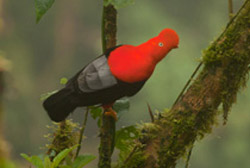Teamwork in the tropics – pollinators and frugivores are less choosy at the equator

The diet of the bright crimson Andean Cock-of-the-rock (Rupicola peruviana) includes fruits of over 100 different plants of the tropical montane rainforest.<br><br>© Matthias Dehling<br>
It is in good company, since other seed-dispersing birds and pollinating insects in the tropics are also – contrary to prior doctrine – less specialised on individual plant species than their temperate counterparts.
This is the outcome of a study conducted by an international research group, which is published today in the journal “Current Biology”. This suggests that ecosystem functions such as pollination and seed dispersal in the tropics have a higher tolerance against extirpations of individual species than in the temperate communities.
It is a win-win business for bees and plants: bees forage on plant nectar, and in return they pollinate the next flower they visit. Virtually the same is true for fruit-eating birds, which by the way disperse the seeds of plants. A large number of such mutualistic interactions between species exist in an ecosystem, which together form a complex network. Scientists have now analysed the “Who with whom?” in a worldwide study and have discovered that the specialization of pollinators and seed disperses on individual plant species decreases towards the equator.
Surprising results: Specialists tend to be in the temperate zones
That is somewhat unexpected; after all, since Darwin it has been assumed that many pollinating insects and seed-dispersing birds in the tropics were specialised on a small part of the available plant species. Until now this co-evolution of reciprocal specialization has been an important explanation for the higher plant diversity in the tropics compared to temperate latitudes. “The results of our global analysis contradict the assumption that ecological communities in the tropics are generally more specialised than those in the temperate zones,” say Matthias Schleuning and Jochen Fründ, the lead authors of the study, from the Biodiversity and Climate Research Centre (BiK-F) and the University of Göttingen.
Generalisation as a response to plant diversity
“Our results show that specialization between animal and plant species tend to be rather a consequence of the available resources than the result of long-term adaptation processes,” explains Schleuning. This is also supported by a further finding of the study, according to which contemporary climate and the plant diversity in an ecosystem are more closely related to the interactions between animals and plants than past climate stability. “A simple explanation for this could be that the high tropical plant diversity provides many different resources to animals in a low density. “Whoever is not especially choosy is at an advantage, because then the next food source is not very far away, making foraging more efficient,” says Fründ.
Ecosystem functions in the tropics are probably more robust
The lower specialization in the tropics also provides advantages for the plants, because they are better insured against species extirpations – plants interacting with a number of animal species have a lower risk of extinction if individual species of pollinators or seed dispersers disappear or decline in number. “We therefore suppose that certain ecosystem functions such as pollination and seed dispersal are less susceptible to disruption in the tropics than in the temperate zones. Due to the generalised relationships and the greater diversity, more species can replace the functions of individual declining species,” says Nico Blüthgen, the initiator of the study of TU Darmstadt. Such failures in the relationship between animals and plants can even have a considerable economic impact. This is demonstrated by the current massive collapse of bee colonies in the US, which leads to particularly high costs in those places where there is a lack of alternative pollinators.
For further information please contact:
Dr. Matthias Schleuning
LOEWE Biodiversity and Climate Research Center
Phone + 49 (0)69 7542 1892
matthias.schleuning@senckenberg.de
or
Sabine Wendler
LOEWE Biodiversity and Climate Research Center, Press Officer
Phone + 49 (0)69 7542 1838
sabine.wendler@senckenberg.de
Press images are available in 300 dpi upon request. Please email to sabine.wendler@senckenberg.de
Paper:
Schleuning et al., Specialization of Mutualistic Interaction Networks Decreases toward Tropical Latitudes, Current Biology (2012), http://dx.doi.org/10.1016/j.cub.2012.08.015
LOEWE Biodiversität und Klima Forschungszentrum, Frankfurt am Main
With the objective of analysis the complex interactions between biodiversity and climate through a wide range of methods, the Biodiversität und Klima Forschungszentrum [Biodiversity and Climate Research Centre] (BiK‐F) has been funded since 2008 within the context of the Landes‐Offensive zur Entwicklung Wissenschaftlich ökonomischer Exzellenz (LOEWE) of the Land of Hessen. The Senckenberg Gesellschaft für Naturforschung and Goethe University in Frankfurt as well as other, directly involved partners, co‐operate closely with regional, national and international institutions in the fields of science, resource and environmental management, in order to develop projections for the future and scientific recommendations for sustainable action.
Media Contact
All latest news from the category: Life Sciences and Chemistry
Articles and reports from the Life Sciences and chemistry area deal with applied and basic research into modern biology, chemistry and human medicine.
Valuable information can be found on a range of life sciences fields including bacteriology, biochemistry, bionics, bioinformatics, biophysics, biotechnology, genetics, geobotany, human biology, marine biology, microbiology, molecular biology, cellular biology, zoology, bioinorganic chemistry, microchemistry and environmental chemistry.
Newest articles

Properties of new materials for microchips
… can now be measured well. Reseachers of Delft University of Technology demonstrated measuring performance properties of ultrathin silicon membranes. Making ever smaller and more powerful chips requires new ultrathin…

Floating solar’s potential
… to support sustainable development by addressing climate, water, and energy goals holistically. A new study published this week in Nature Energy raises the potential for floating solar photovoltaics (FPV)…

Skyrmions move at record speeds
… a step towards the computing of the future. An international research team led by scientists from the CNRS1 has discovered that the magnetic nanobubbles2 known as skyrmions can be…





















